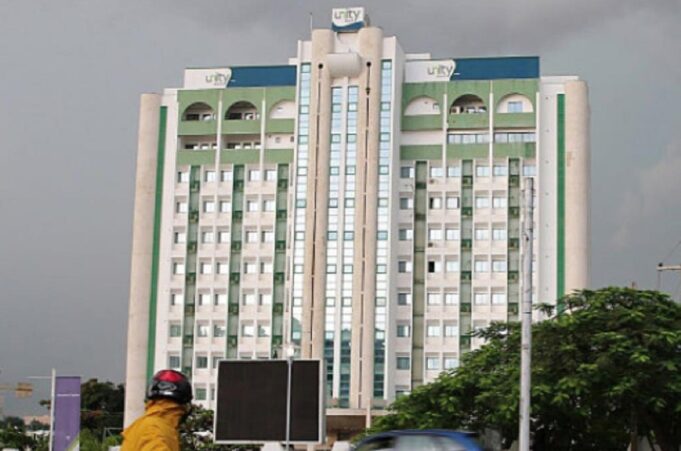Unity Bank Plc has recorded N333.38 billion as its gross earnings between January and June 2023.
This represents a marginal increase of two per cent compared to N327.42 billion recorded in H1’2022 in bank’s half-year unaudited financial statement submitted to the Nigeria Exchange Group Limited.
Unity Bank’s gross income and total assets were N27.5 billion as against N27.4 billion and N512.1 billion from N510.1 billion, respectively, within the period under review.
The bank, in the report, said the net loans portfolio reduced significantly by 31 per cent to N198.6 billion as of June 30, 2023, from N289.4 billion as of December 31, 2022.
The bank’s NPL ratio remained moderate at below three per cent while liquidity ratio stood strong at over 45 per cent.
However, Unity Bank noted that its profit for the period was impacted by foreign exchange revaluation on the back of Nigeria’s recent FX liberalization policy, resulting in a slide in the bank’s position.
It stated that the retail lender grew its FX trading income by 17 per cent to N239.8 million from N204.4 million in the corresponding period of 2022, saying it underscored the bank’s strategic focus on diversifying and growing its earnings portfolio.
The bank added that fees and income commission also witnessed a 10 per cent growth to N3.5 billion from N3.2 billion compared to the corresponding period of 2022, on the strength of the growing popularity of its digital banking platforms and customers’ acquisition in the retail space.
Speaking on the financial statements, the Managing Director/CEO of Unity Bank Plc, Tomi Somefun, noted that the significant disruptions which she said characterised the operating environment has impacted the positions of the bank to the extent that “we have constraints in income generation on the back of revaluation of the bank’s net foreign liabilities occasioned by the Naira devaluation during the period.”
Somefun added: “In the light of the prevailing FX revaluation in the financial system, what we have is a market-driven impact which is adjustable envisaged from the positive economic outcomes of the government policies in the near term.
“Be that as it may, the negative shareholders’ fund has improved considerably through the injection of N135billion which moderated the negative shareholders’ fund from (-ve) N275 billion in December 2022 financial year-end to (-ve) N178 billion as of the end of June 2023, after absorbing the FX revaluation loss suffered in Q2/2023.
“We are, however, focused with clear-cut plans to close out on our recapitalisation programme very soon to enable us do business as expected in the fast-growing markets in Nigeria.”
- SAHCO wins British Airways Punctuality Award - May 16, 2024
- Students injured in OAU classroom collapse - May 16, 2024
- Emirates Airlines returns to Nigeria, begins Dubai flights Oct 1 - May 16, 2024










